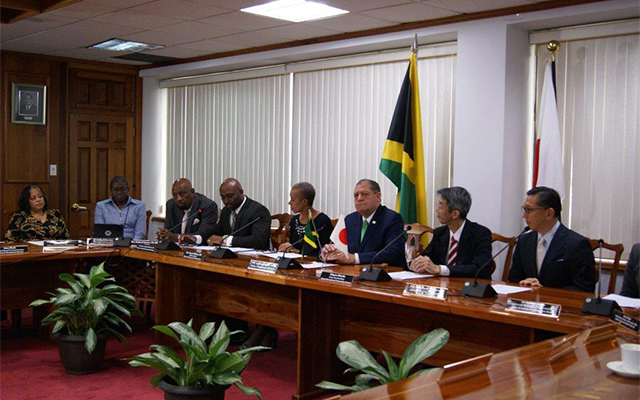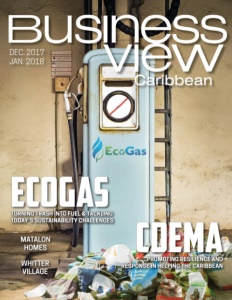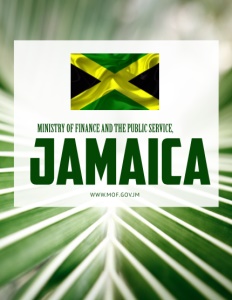Business View Caribbean recently spoke with Minister Shaw about his Global Markets Award; and his highly successful second term in office.
In conversation with Finance Minister Audley Shaw
Recognized by Global Markets newspaper as 2016’s Finance Minister of the Year for the Caribbean, Jamaica’s Audley Shaw is a jovial, intelligent champion of his country, its people, and its prosperous economic outlook for the future.
Business View Magazine recently spoke with Minister Shaw about his Global Markets Award; his highly successful second term in office; and several extraordinary projects in progress that are raising Jamaica’s status with international investors. Here is an edited version of our conversation:
BVM: What is the primary role of Ministry of Finance and Public Service in Jamaica?
Minister Shaw: “Our role is to make sure we have a stable economy in which you build confidence among investors and increase employment and incomes. I am Minister, second time around – first from 2007 to 2011. Then there was an election and we were sent on a ‘forced vacation.’ We came back in Feb. 2016, and due to the reforms that we launched during the first round, we’re seeing the cumulative benefits of now. Inflation is at historic lows and you know how important that is in the effort to protect living standards and reducing poverty. Our exchange rate is fairly valued and is governed by a transparent market mechanism lauded by the IMF. This is a vital element to ensure the competitiveness that Jamaica needs to regain the high rates of growth last seen in the 1980’s.
“One of my mantras as Minister of Finance has been to pursue the target of delivering single-digit interest rates for our manufacturers and business people. In 2007, the previous government was borrowing money on the international capital markets at 12 percent. I tapped the capital markets in August this year and was able to raise $1 billion (US) at rates as low as 4.5 percent and no higher than 6 percent. That’s investment grade interest rates on the international level. That reduces our debt service costs and increases the space for social investments and a stronger safety net for the most vulnerable.”
BVM: Congratulations on your prestigious award. Could you share your thoughts on being Finance Minister of the Year for the Caribbean, and how it relates to your leadership within the financial sector?
Minister Shaw: “Thank you. I consider my receiving that award not so much as a personal thing. I accepted it on behalf of my government, Prime Minister Andrew Holness, and the people of Jamaica. Because the program we’re implementing with the technical support of the International Monetary Fund (IMF) requires very tight fiscal consolidation to achieve our goals for debt reduction. This has been described by international analysts as the toughest stabilisation programme in recent world history. It implies a significant level of sacrifice from the public sector workers in terms of wage expectations, and generally from the citizens of the country.”
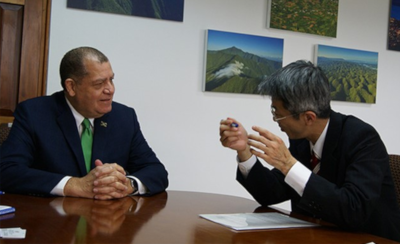 “Primarily, the award speaks to the fact that we successfully completed an IMF economic reform program last year in which we passed all 15 reviews without the need for a waiver of any of the reform commitments. The successful implementation of the programme has enabled us to reduce the national debt as a percentage of Gross Domestic Product (GDP) from 150 percent four years ago, to 115 percent now. By the end of this fiscal year, the debt to GDP ratio will be down to 108 percent. The goal is also to boost growth. This means that we will have to put an end to the decade’s long stagnation in productivity. We need to decrease the deficit in productive infrastructure and invest in our people. In addition to sharp debt reduction, over the past two years we’ve achieved a fall in the unemployment rate from 12.7 percent to 11.3 percent now. In the last year, the labor force grew by about 30,000 people, and 35,000 new jobs were also created.”
“Primarily, the award speaks to the fact that we successfully completed an IMF economic reform program last year in which we passed all 15 reviews without the need for a waiver of any of the reform commitments. The successful implementation of the programme has enabled us to reduce the national debt as a percentage of Gross Domestic Product (GDP) from 150 percent four years ago, to 115 percent now. By the end of this fiscal year, the debt to GDP ratio will be down to 108 percent. The goal is also to boost growth. This means that we will have to put an end to the decade’s long stagnation in productivity. We need to decrease the deficit in productive infrastructure and invest in our people. In addition to sharp debt reduction, over the past two years we’ve achieved a fall in the unemployment rate from 12.7 percent to 11.3 percent now. In the last year, the labor force grew by about 30,000 people, and 35,000 new jobs were also created.”
BVM: Is this due to foreign investment? New companies coming into Jamaica? Expansion of existing businesses?
Minister Shaw: “It’s a combination. We’re seeing more vibrancy in commerce and trade, locally, as well as manufacturing. But we’re also aggressively targeting the tourism industry. We have approximately 14,000 additional hotel rooms being built over the next four years. The first 3,000 are already in the ground, and when all are completed it will add some 30 percent to the stock of hotel rooms in Jamaica, and enhance employment in tourism. These are mostly foreign investors; we have heavy interest out of Mexico, Spain, other areas of Europe, and Canada.
“We also have a Business Process Outsourcing sector. The off-shore office is another way to describe it – call centers providing information about goods and services, etc. People might phone from Canada or the U.S. and somebody in Jamaica answers the call. In a few short years, it’s grown to about 25,000 jobs. We expect that to double in two years. At maturity, we think it can reach 100,000 new jobs in total for the sector.”
BVM: How does agriculture fit into the economic plan?
Minister Shaw: “We are seeking to create more direct linkages between agriculture and tourism. Instead of importing food that can be produced in Jamaica, the plan is to have more small farms here producing goods for tourists to consume. That includes poultry (where we are self-sufficient) and a wide range of fruit and vegetables. Over 200,000 small farmers in Jamaica can have a direct linkage to a better life by producing more, and helping to feed millions of tourists that come here annually.
“In the past, we ignored the granular linkages that must exist if you want to maximize your benefit from tourism. So, we’ve established a Tourism Linkages Committee to systematically identify areas of need for hotels and visitors, in terms of attractions, food, drink, and so on.
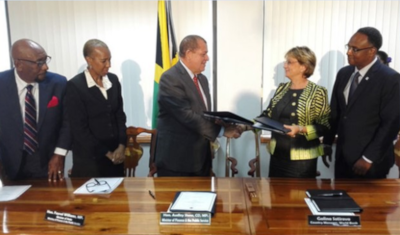 “For instance, we are going to be reopening the Appleton Rum Tour – a rail excursion taking tourists from Montego Bay to the deep rural sugar estate where the rum is made. The tour was shut down some years ago, and now a $40 million (US) private sector investment will see the trains running again. The company that produces rum just completed an $8 million (US) investment to refurbish their visitor’s facility. The tour experience will let tourists stop along the way to meet local people, eat jerk chicken, visit a local bar. That benefits our economy and the people of Jamaica.”
“For instance, we are going to be reopening the Appleton Rum Tour – a rail excursion taking tourists from Montego Bay to the deep rural sugar estate where the rum is made. The tour was shut down some years ago, and now a $40 million (US) private sector investment will see the trains running again. The company that produces rum just completed an $8 million (US) investment to refurbish their visitor’s facility. The tour experience will let tourists stop along the way to meet local people, eat jerk chicken, visit a local bar. That benefits our economy and the people of Jamaica.”
BVM: What other types of development are contributing to Jamaica’s growing economy?
Minister Shaw: “We just reopened the Alpart Alumina production facility in St. Elizabeth, which closed in 2009 during the global economic meltdown. A Chinese company, Jisco, will ship out their first alumina shipment in December. The plan is to eventually double production by building a second plant. Jisco is also building their own liquid natural gas energy plant to power their factories. The investment at maturity will be about $2.5 billion (US), employing about 3,000 Jamaicans.
“We have major infrastructure projects along the North-South Highway: hotels to be built on the north coast termination point of the highway, and housing along the highway corridor that connects Ocho Rios to the capital city of Kingston. In addition, there will be a major economic zone at the southern end of the highway, not far from the expanded Port of Kingston. We divested it to a French company called CMA CGM Jamaica – they are dredging the harbor to receive the new super cargo liners coming through the Panama Canal.
“Logistically, Jamaica is the first port of call for ships coming out of the Panama Canal. When people think about travelling from Europe or the Far East to the western hemisphere, their points of entry are usually Miami, Panama City, and other U.S. and Canadian cities. We want to competently and aggressively drill down on the concept of Jamaica as a western hemisphere logistics center for trans-shipment purposes, where a U.S. visa is not required.
“Another major project is to redevelop our urban center of downtown Kingston. That involves building a new parliament building. All ministries and departments will be around the National Heroes Circle, with parliament in the middle. Then, at Vernam Field, in south-central Jamaica, we’re going to create a new logistics center for cargo and people movement. The defunct World War II airbase, recently used for car racing on Sundays, will be re-established at an international level with maximum runway length for a modern commercial airport. It is important to note that these mega developments will utilise a PPP modality that limits the increase of public debt.
“Not far from that location is potential for a seaport, and thousands of acres suitable for assembly of goods, ship repair, and aircraft repair. We already have investors developing business plans for bidding on it. By the way, all these projects are private sector investments – not government.
BVM: What are your administration’s goals for the future of Jamaica?
Minister Shaw: “After 54 years of political independence, it’s time for Jamaica to gain economic independence. That’s what the Prime Minister and his government are focused on: economic enablement; job opportunities; job training. The reform of our educational system to ensure all our little children from age three upwards get a good foundation.
“Too many of our kids that enter grade one and primary school are functionally illiterate. This becomes a major crisis for us. We have problems with crime and lack of productivity. But our biggest problem is that of human development. We must start at the beginning and give every child born in this country the opportunity to be in the early childhood system.
“You cannot create prosperity unless you focus on the minds of your people. Prosperity begins in your mind, not your pocket. We need to give our people hope. To inspire them to believe in themselves and to understand that, in pursuing excellence, one person can make a difference. If each Jamaican uses ‘I want to pursue excellence’ as a source of inspiration, that is how we’re going to achieve prosperity.”
Check out this handpicked feature on Jamaica Aggregates in Jamaica.

